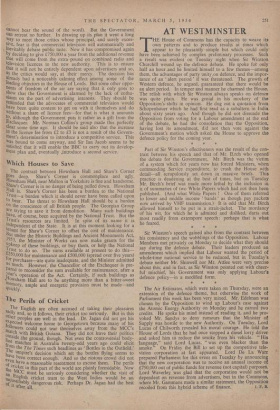AT WESTMINSTER T HE House .of Commons has the capacity to
weave its own patterns and to produce results at times which appear to be pleasantly simple but which could only' have been achieved by complex preliminary processes. Such a result was evident on Tuesday night when Sir Winston Churchill wound up the defence debate. He spoke for only half an hour and he limited himself to a few themes—among them, the advantages of party unity,on defence, and the impor- tance of an ' alert period ' if war, threatened. The growth of Western defence, he argued, guaranteed that there would bo an alert period. In temper and manner he charmed the House. The relish with which Sir Winston always speaks on defence was quite plain. He was genial in his mockery of the Opposition's shifts in opinion. He dug out a quotation from Schopenhauer which he had first read as a subaltern in India about sixty years ago. And though he did not dissuade the Opposition from voting for a Labour amendment at the end of the debate, he had the consolation that the Opposition, having lost its amendment, did not then vote against the Government's motion which asked the House to approve the defence policy for the coming year. * * * Part of Sir Winston's effectiveness was the result of the con- trast between his speech and that of Mr. Birch who opened the debate for the Government. Mr. Birch was the victim of a system which for years now has forced Ministers, when commending Service expenditure, to crush the House with detail—all scrupulously set down in massive briefs. This practice is deadening at the best of times, but on Tuesday Mr. Birch's brief was made more lethal by the inclusion in it of summaries of two White Papers which had not then been published. (And what White Papers l One of them referred to lower and middle income ' bands ' as though pay packets now arrived by VHF transmission.) It is odd that Mr. Birch allowed himself to be put in a strait-jacket. The mordancy of his wit, for which he is admired and disliked, darts out most readily from extempore speech: perhaps that is what he feared. * . * * Sir Winston's speech gained also from the contrast between his consistency and the wobblings of the Opposition. Labour Members met privately on Monday to decide what they should say during 'the defence debate. Their leaders produced an amendment which implied that Labour wanted the period of whole-time national service to be reduced, but in Tuesday's debate neither Mr. Shinwell nor Mr. Attlee were very precise about this; and in fact, as Sir Winston pointed out with cheer- ful mischief, his Government was only applying Labour's defence policy—in a modified form. * * * The Air Estimates, which were taken on Thursday, were an extension of the defence theme, but otherwise the work of Parliament this week has been very mixed. Mr. Edelman was chosen by the Opposition to wind up Labour's case against the Atomic Energy Authority on Monday and he earned two credits. He spoke his mind instead of reading it, and he pro- voked Mr. Sandys to deny rumours that the Minister of Supply was hostile to the new Authority. On Tuesday, Lord Lucas of Chilworth revealed his moral courage. He told the House of Lords that he had once stopped a diesel lorry driver and asked him to reduce the smoke from his vehicle. " His language," said Lord Lucas, " was even blacker than the smoke." On Friday the Bill to set up the competitive tele- vision corporation at last appeared. Lord De La Warr prepared Parliament for this event on Tuesday by announcing that the new corporation was to receive an annual income of £750,000 out of public funds for revenue (not capital) purposes. Lord Waverley was glad that the corporation would not be dependent on revenue from advertisers, but in the Commons. where Mr. Gammans made a similar statement, the Opposition recoiled from this hybrid scheme of finance. J. F. B.


































 Previous page
Previous page